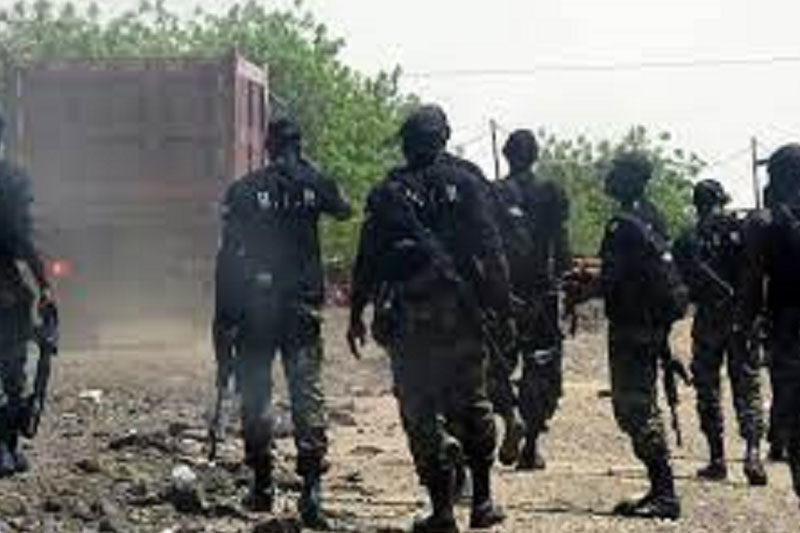A soldier – described as being “rogue and on the rampage” – killed a humanitarian aid worker by shooting and stabbing her, and then he shot and killed a fellow soldier who was trying to disarm him. A co-pilot of a United Nations helicopter was also shot and wounded.
Members of the Theatre Command Operation Hadin Kai were ordered to immediately “neutralise the errant personnel”.
The incident happened in Damboa in Borno State on Thursday, November 17.
Major Nantip Zhakom, assistant director of army public relations, Operation Hadin Kai Maiduguri, said the injured co-pilot had been stabilised. “The corpses of the deceased have been moved to the 7 Division Hospital. A detailed investigation into the incident and subsequent remedial actions have commenced into the highly regrettable incident.”
Matthias Schmale, the UN coordinator for Nigeria, described the incident as “disturbing and sad”, saying the woman was a humanitarian aid staff member of Médecins du Monde working in the community.
In a statement issued on Friday, he said: “On behalf of the United Nations, I convey my heartfelt condolences to the aid worker’s family and to her colleagues. I also wish a speedy recovery to the pilot.”
A humanitarian worker, who asked to remain anonymous for security reasons, told RNI reporter Alkali Mustapha that the armed soldier “who appeared out of nowhere” started shooting at pilots and passengers of the helicopter.
He said as they ran for cover the woman aid worker, who was shot, fell and the soldier stabbed her several times. He also killed a soldier who tried to disarm him.
A statement issued by the Nigerian Army, confirmed the death of the aid worker, who was identified as Alem Muluseta.
The Borno State government, in a letter to the UN, extended condolences to her family. It also promised to work with the military and humanitarian partners to try to support soldiers who had mental disorders.
James Gala, a national security analyst, told RNI reporter Aisha Jamal that many factors contributed to soldiers apparently “going rogue”.
He said many soldiers lived among civilians and their job was to help police officers to protect residents because the police alone were not able to fight off insurgents. But, Gala said, the soldiers had not been trained to do police work and sometimes they were mentally unstable and acted recklessly or, as in this case, killed someone. He said it was not a new phenomenon and had happened “quite a few times”.
“Many soldiers are poor and their work demands a lot of them; they have to leave their families behind when they are sent to the frontlines, sometimes for long periods of time. It’s a sacrifice they make, but it can lead to extreme trauma which can sometimes trigger these rogue episodes. It is known and is not unusual that long periods on the frontlines can affect the mental state of soldiers.”
Gala said once the insurgency came to an end, soldiers would be removed from civilian settlements and would remain in army barracks, which would put an end to attacks of this nature.
He recommended that the military should provide constant trauma support for soldiers because mental fitness was as important, if not more so, than physical fitness.
The UN’s Schmale described the attack on the Humanitarian Air Service (UNHAS) as deplorable.
“All humanitarian staff working in northeast Nigeria deserve our fullest respect for their courage and commitment to stay and deliver lifesaving assistance to people in need in often difficult and dangerous circumstances. Humanitarian workers must be protected.
“I laud the government and the military’s efforts to speedily investigate yesterday’s incident and urge them to strengthen remedial measures to prevent similar incidents in the future.”
The UNHAS has suspended all helicopter missions to and from the operations area until further notice.
Residents of Damboa said they feared they would lose humanitarian support because of such incidents.
Bukar Grema said: “We are saddened by what happened. If things like this continue to happen we will lose the support of humanitarian aid organisations, which we depend on. The government must do something to ensure incidents like this do not happen again. We are scared these things will drive humanitarian organisations away.
“The NGOs help us a lot and we don’t want anything bad to happen to them. Our families have gone to the hospital [to visit the wounded co-pilot] but management turned them away.”
Abubakar Abbas said: “We don’t have good roads, hospitals and food in the Damboa Local Government Area. Life is hard. We fear the incident that happened on Thursday will result in the withdrawal of aid workers. It that happens, I don’t know what the people here will do.
“Everyone is tense. We just hope the authorities do whatever it takes to stop these acts.”
AISHA SD JAMAL






